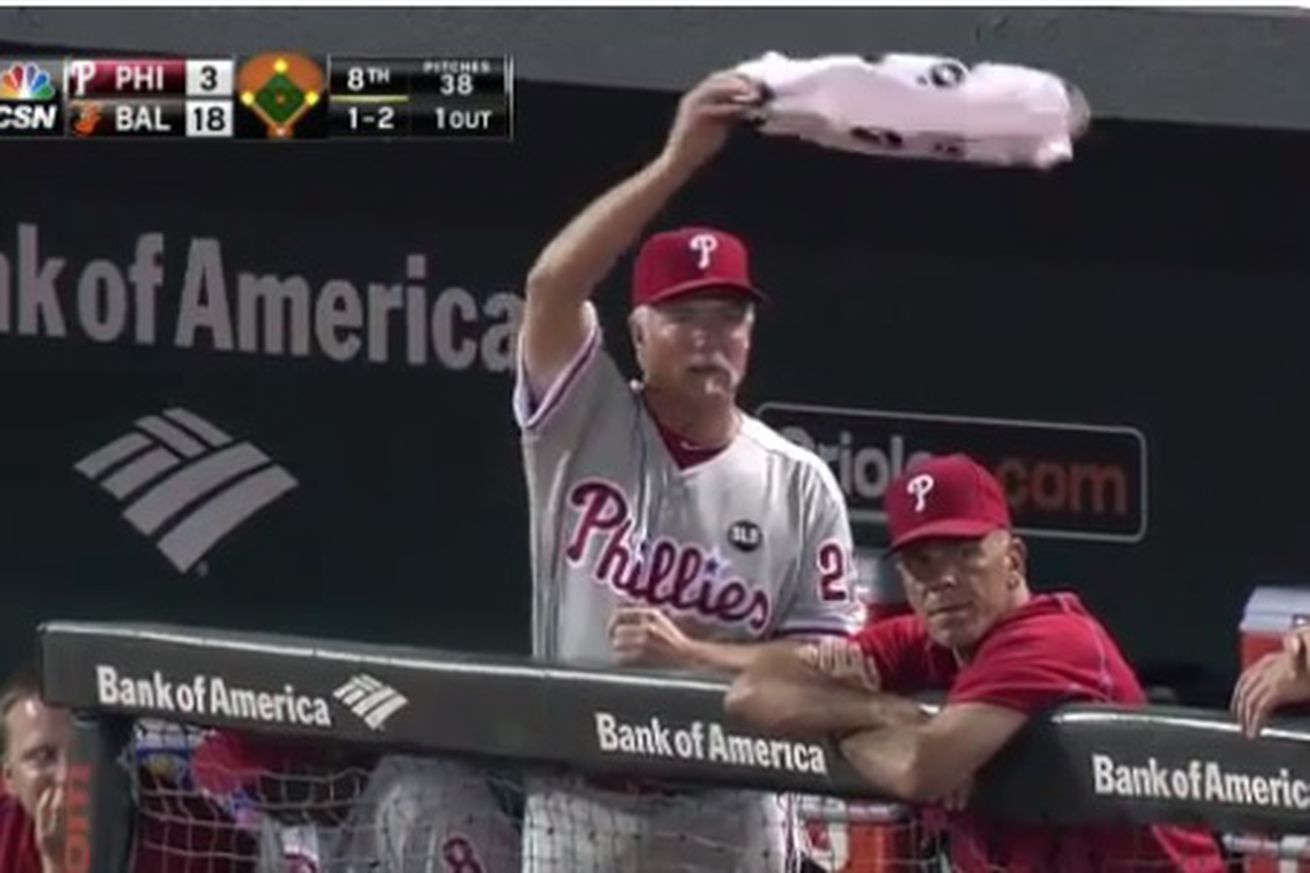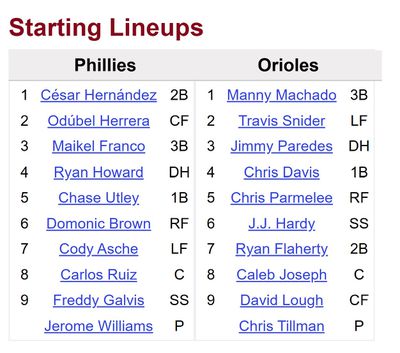
Let’s remember the nadir of the Phillies rebuild
Where were you on June 16th, 2015?
Hopefully, it was somewhere where you were not watching the Phillies take on the Orioles in Baltimore.
That fateful night, now exactly ten years ago, provided an image that became the lasting legacy not only of the 2015 Phillies, but the whole rebuild era itself. But before we talk about that infamous moment, let’s remember how we got there.
The Phillies came into that night on a seven-game losing streak and a 3-10 record in the month of June. Their season was already well over by that point, as they were already 20 games below .500 at 22-43 and in a two loss “lead” for the worst record in baseball. They were in some of the deepest, darkest recesses of the rebuild, desperate for any resemblance of hope that the future would be better.
They didn’t find it the night before, as they suffered their seventh straight loss in 4-0 fashion in the opening of the series in Baltimore. Orioles’ starter Wei-Yin Chen tossed 8 shutout innings on 106 pitches, allowing only four hits and a walk to go along with 9 strikeouts. Two of those four hits were from César Hernández with the others being a pair of singles from designated hitter Chase Utley and left fielder Cody Asche. Zack Britton needed 18 pitches to retire the side that consisted of the top of the Phillies order in the ninth.
But there’s always tomorrow in baseball, a saying that is supposed to inspire hope and confidence but in 2015 seemed to sound like a threat. Nevertheless, the Phillies once again took the field in Baltimore trying to find that ever elusive W to put into the column.
Here are the starting lineups for the two teams that day:

Baseball Reference
Phillies starter Jerome Williams entered the game on a losing streak of his own, as he was given the loss in three of his last five starts and the team itself was 0-5 in those games. He had allowed 20 runs and 6 home runs in just 26.1 IP over that span,
But it wasn’t much better for his counterpart for the Orioles. Chris Tillman entered the 16th of June with a 4.73 ERA in his last five starts. Luckily for him though, the Orioles were a better baseball team than the Phillies, so they had managed to win three of those five starts anyway.
The Phillies however actually got off to a good start, or at least by their standards. César Hernández led off the game with a walk and then stole second. That put a runner in scoring position for rookie rule 5 selection Odúbel Herrera. He promptly awarded Hernández’ effort in trying to get something, anything going with a strikeout. That brought Maikel Franco to the plate, and he almost immediately popped up to the first baseman for the second out. But have no fear, as that brought a shambling corpse Ryan Howard to the plate. He had driven in over 1,000 runs to this point in his career. Surely, he will come up with a clutch two-out hit that w-oh he lined out to the right fielder on the second pitch.
Manny Machado did something a little different on the second pitch he saw in the bottom of the first, as he blasted a leadoff home run to give the Orioles the lead. That kicked off a six-run bullying in the first inning, as Williams was able to record just two outs before exiting the game following four hits, two walks, and a 6-0 deficit. It only took the Orioles 26 pitches to remind the Phillies about that simple fact we mentioned before. That is, that they were not a good baseball team.
Dustin McGowan replaced Williams and mercifully ended the first inning. He then came back out for the second after the Phillies went down on just 15 pitches in their half of the inning. McGowan must’ve thought Groundhog Day came early (or late?), as the bottom of the second started the same as the bottom of the first, with Manny Machado launching a home run off of a Phillies pitcher whose name awakens something inside you like the Winter Soldier.
But the bullying wasn’t done yet, as McGowan allowed two more home runs in the second inning, this time from future Phillie Jimmy Parades and Chris Parmelee. In case you weren’t keeping track, that was 4 home runs allowed by Phillies pitching in just two innings.
McGowan was able to successfully avoid surrendering a third straight inning opening home run, but he only delayed the inevitable, as future Phillie David Lough swatted homer number five to right field, this one of the three-run variety, giving the Orioles a 12-0 lead in just the third inning.
But the Fightin’ Phils weren’t going to just lie down and die this time! Herrera began the fourth with a double before Maikel Franco popped up again, this time making it a little further to second base. Howard walked before Chase Utley flew out, bringing Domonic Brown to the plate with two on and two out. He managed an infield single that scored Herrera and got the Phillies on the board. Take THAT Baltmore! Then Cody Asche ended the inning with a fly ball to center.
Ok, if McGowan could just throw a clean inning, maybe the Phillies can oh wait he just gave up another inning opening home run. Chris Davis took him deep this time, the sixth time on the evening a Phillies pitcher would watch a ball fly over the fence while feeling dead inside.
Franco forgot what team he was on for a split second in the sixth, hitting a home run of his own before realizing the Phillies weren’t allowed to do that. Then it was Justin de Fratus’ turn to try and get this over with, and he clearly understood the assignment, as he gave up yet another inning opening home run to Parmelee. If your eyes have glazed over by now, that’s now 7 home runs for the Orioles, two apiece by Machado and Parmelee, and four of the six bottom half innings that have started with an Orioles home run.
Then the game descended into what former TGP-er and current Hittin’ Season-er Justin Klugh called “performance art” in a retrospective from 2018. The rest of the sixth inning involved a pitching change, three more Orioles hits, two more runs, catcher’s interference, and an error that turned a double into an RBI double. It was 17-3 and beyond the point of surrealism as outfielder Jeff Francoeur took the mound to pitch the seventh inning.
In a comical twist of irony, Francoeur threw the first clean inning for Phillies pitching. He threw 16 pitches, but manager Ryne Sandberg clearly recognized that Francoeur was his best pitcher at this point and sent him back out for the eighth. Francoeur then got in on the fun and allowed the Orioles-new-franchise-record-setting eighth home run of the night, this time off of the bat of Ryan Flaherty.
Francoeur then hit the next batter with a pitch, a bit of good ol’fashioned retaliation no doubt, before recording a flyout for the first out of the inning. At this point, most normal people (who am I kidding, no normal people were still watching this game at this point) may have realized “Hey, this non pitcher sure has thrown a lot of pitches.” And that would be a very accurate assessment, as Francoeur was up to 35 pitches when Parades came to the plate and was visibly exhausted.
Ryne Sandberg, ever the masterful tactician, decided it was time to save his best pitcher for another day. It was time to make a call to the bullpen.
Only there was one problem.
The bullpen phone was off the hook.
That’s right, a dumbfounded Tom McCarthy narrated that fact over a camera close up showing the phone dangling off the hook while bullpen coach Rod Nicols idly sat beside it thinking about anything besides this baseball game.
Something needed to be done, so Sandberg and pitching coach Bob McLure hatched an idea. McClure grabbed a white towel from the dugout, stood on the bench, raised it high over the railing, and literally began waving the white flag.
If there was ever a single image to describe the Phillies rebuild, it was that. A franchise that was just four years removed from its greatest season ever and just seven years removed from a championship, was not even able to understand how phones work. And their best solution to the problem was to wave the flag of surrender.
Five pitches later, Parades hit a sac fly to make it 19-3, Francoeur crossed the 40-pitch mark, and Utley would call his own mound visit to try and protect Francoeur’s health and to berate his manager. Francoeur somehow managed to get the final out and finished with a pitching line of 2 IP, 2 ER, 3 BB, 1 K on 48 pitches. Francoeur had thrown over double the number of pitches as the Phillies actual starting pitcher. Had I mentioned that Francoeur was not a pitcher?
Anyway, the Phillies lost their eighth game in a row, Sandberg would quit about a week later, and the Phillies would continue wandering in the wilderness until the end of the decade. Whenever you think it’s going bad, just think of Bob McClure and that towel.